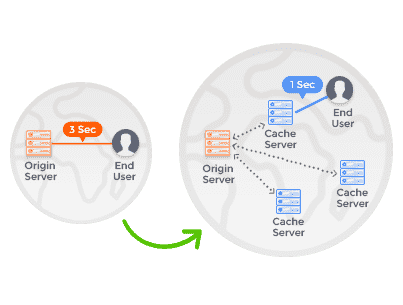What is a Content Delivery Network?
A content delivery network (CDN) is a geographically distributed group of servers that work together to provide quick delivery of Internet content. It helps in quickly transferring assets needed for loading Internet content including HTML pages, javascript files, stylesheets, videos, and images. With the growing popularity of CDN services, the majority of web traffic is presently served via CDNs, including traffic from major sites like Netflix, Amazon, and Facebook.
How Does a CDN Works?
Servers closest to the website visitor respond to the request. The CDN copies the website pages to a network of servers that are distributed at geographically different locations, caching the contents of the page. When a webpage that is part of a CDN is requested by a user, the CDN will go ahead and redirect the request from the originating site's server to a server in the CDN that is nearest to the user and deliver the cached content. Furthermore, CDNs will also communicate with the originating server to deliver any content that has not been earlier cached. The entire process of bouncing via CDNs is almost transparent to the user. The only way a user would get to know if a CDN has been accessed is if the delivered URL is found to be different than the URL that has been requested.

Top 4 Key Benefits of Using Content Delivery Network
Generally, the benefits of using a CDN differ based on the size and requirements of an Internet property, and hence the most basic benefits for most users can be divided into four key components:
Reducing bandwidth costs
Bandwidth consumption costs for website hosting are considered to be a primary expense for websites. Through caching and several other optimizations, CDNs are capable of reducing the amount of data an origin server is responsible for providing, thus lowering hosting costs for website owners.Increasing content availability and redundancy
Huge amounts of traffic or hardware failures can disrupt the normal functioning of a website. The distributed nature of a CDN allows it to handle more traffic and resist hardware failure better than many origin servers.Enhancing website load times
Visitors will be able to experience faster page loading times when distributing content closer to website visitors with the help of a nearby CDN server. As visitors are more likely to click away from a slow-loading site, a CDN will be able to bring down bounce rates and increase the amount of time that people spend on the site. This refers to the fact that a faster website means more visitors will stay around for a longer time.Improving website security
A CDN can also improve web security by providing improvements to security certificates, DDoS mitigation, and other optimizations.
cWatch CDN Service
With this brief introduction to CDNs and their benefits, let's now take a look at what you can benefit from Comodo's Secure Content Delivery Network (CDN). This CDN is part of Comodo's web security called cWatch: a Managed Security Service for websites and web applications that incorporate a Web Application Firewall (WAF) provisioned over a Secure Content Delivery Network (CDN). It is a wholly managed solution from a 24x7x365 staffed Cyber Security Operation Center (CSOC) of certified security analysts and is powered by a Security Information and Event Management (SIEM) capable of leveraging data from more than 85 million endpoints in order to detect and mitigate threats even before they occur. This cWatch web security tool also provides malware detection scanning, preventive methods and removal services that enable organizations to adopt a proactive approach to safeguard their business and brand reputation from infections and attacks. cWatch also offers vulnerability scanning to provide online merchants, businesses, and other service providers handling credit cards online with an automated and simple way to stay compliant with the Payment Card Industry Data Security Standard (PCI DSS).
The Comodo CDN Offers the Following Benefits: [Updated 2024]
Security: This CDN from Comodo is considered to be the only web service platform built on security, with a secure machine learning core that aggregates, examines, and syndicates real-time threat data both to and from each of its security services.
Faster speeds: Website data is copied to 29 locations all over the world to guarantee that data has shorter distances to reach a customer no matter where they are and provide a faster experience. For instance, a person based in Europe will load data from a CDN node based in Europe, even if the website is hosted on a server in the USA.
Save money: Leverages compression and browser caching technology in order to save on bandwidth costs and usage.
Content protection: You will be able to protect “premium/paid” content and prevent hot-linking by putting in place flexible key and proxy authentication.
SEO rewards: Search engines reward websites using CDN with higher rankings on search results.
High availability: With the CDN being capable of serving content, with almost unlimited capacity, traffic can be automatically scaled up and down. Additionally, unpredicted surges in traffic will no longer be a challenge to the server because it will be able to maintain speed and optimal speed under difficult conditions.





